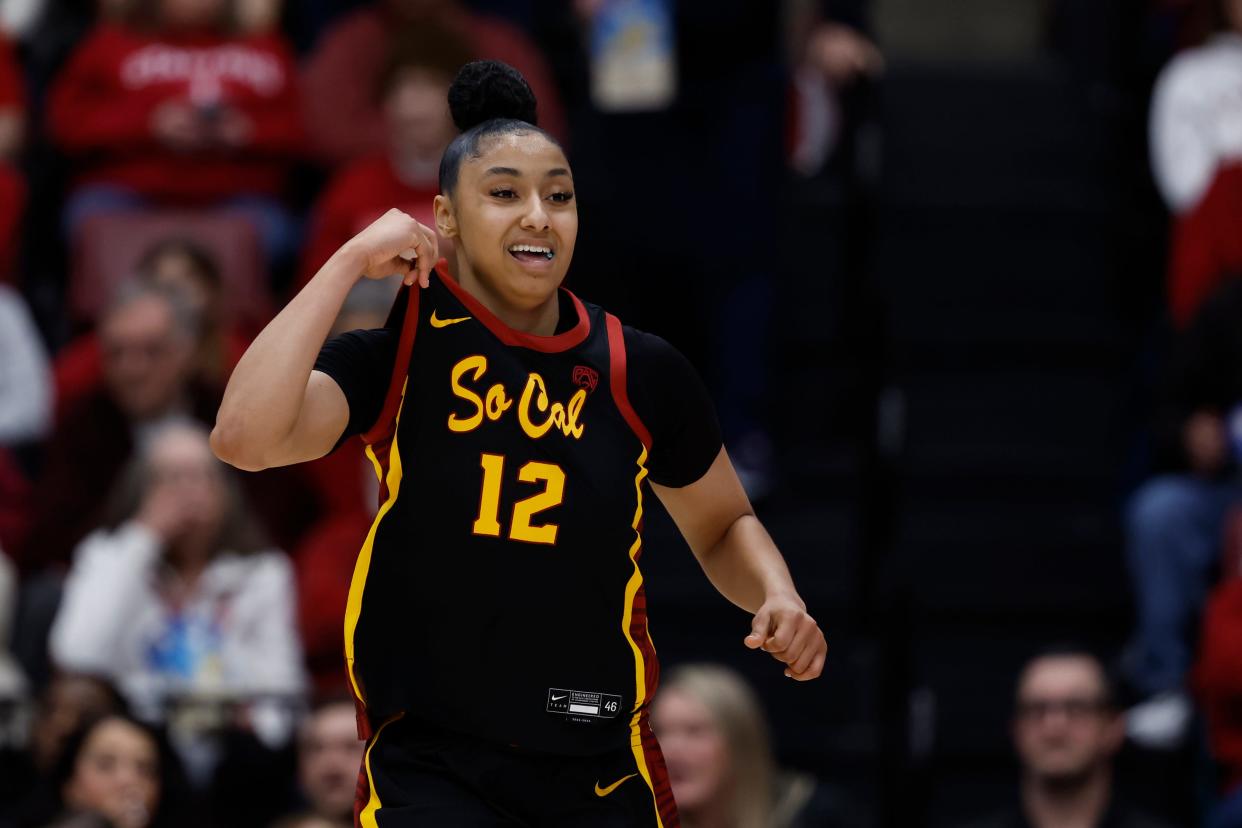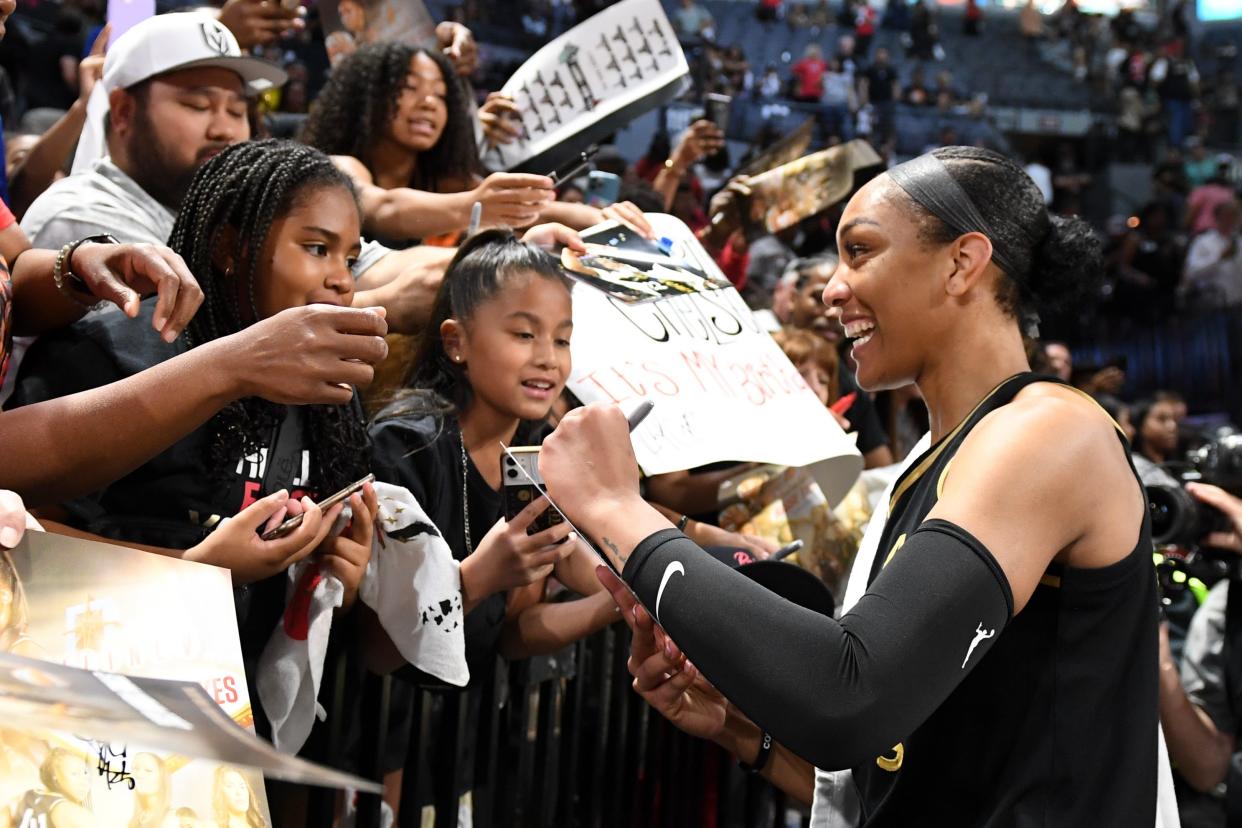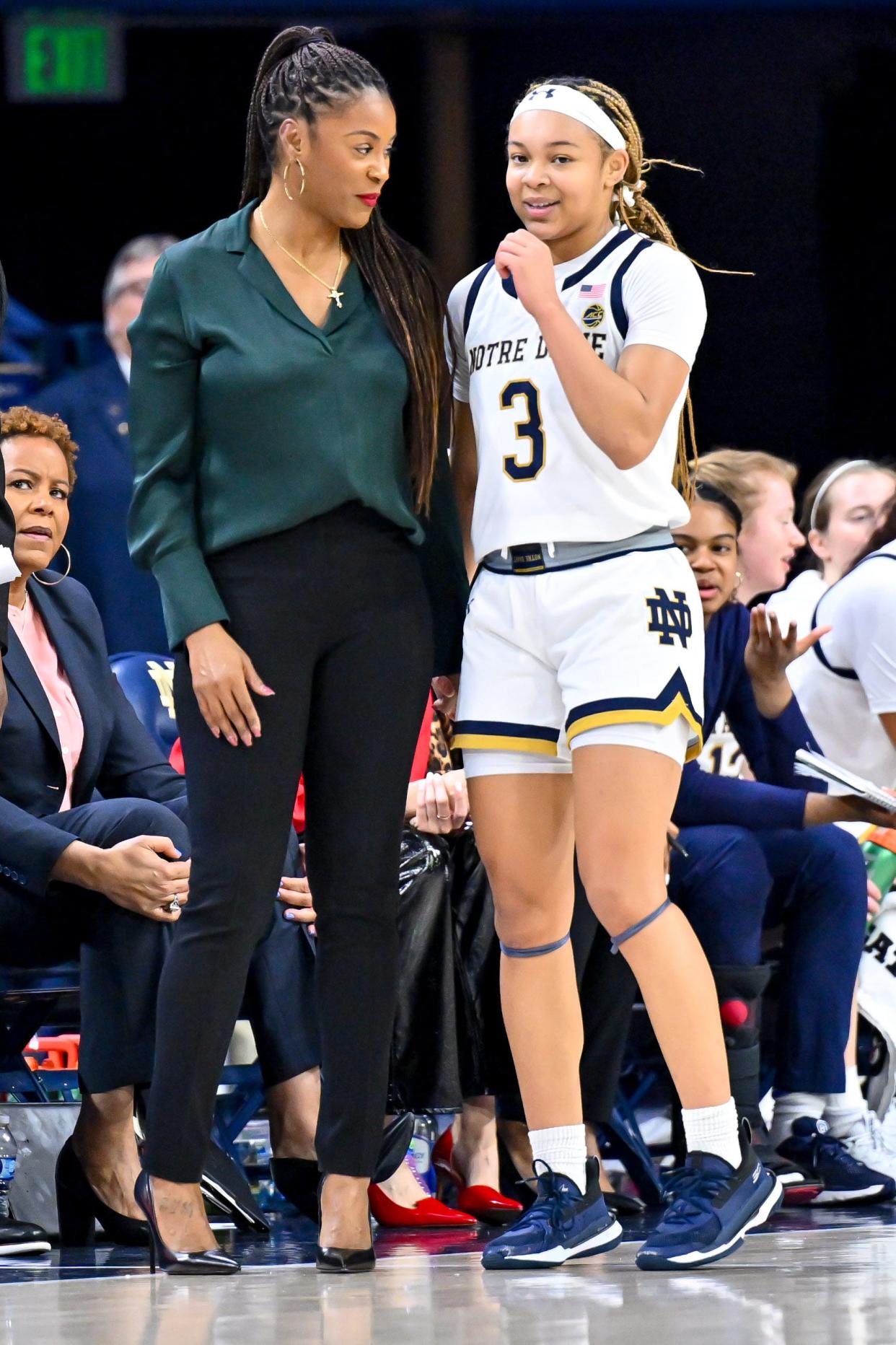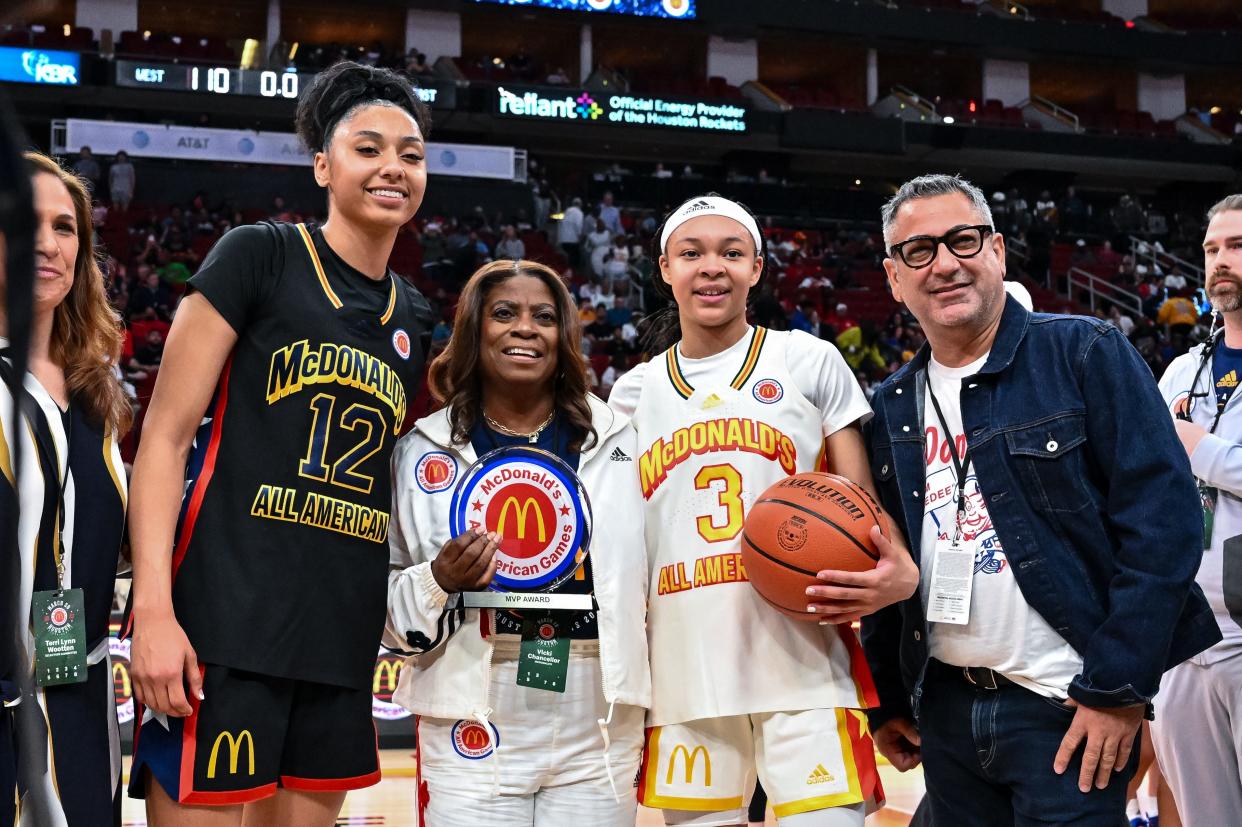Women's basketball needs faces of future to be Black. Enter JuJu Watkins and Hannah Hidalgo
Editor's note: Follow live coverage of the NCAA women's tournament bracket reveal here.
JuJu Watkins crossed over her defender, stepped into the lane and floated a pretty runner into the hoop. The whistle blew, and Watkins stepped to the line for an and-1. Over the Galen Center loudspeaker, the voice of DJ Malski, the Trojans’ in-house hype man, rang above the crowd.
“Yeahhhhhhh, Ju,” Malski crowed as Watkins swished her free throw attempt.
“Yeahhhhhhh, Ju,” the crowd parroted back.
It’s understandable why Watkins, the front-runner for national freshman of the year, sparks this kind of reaction. The 6-foot-2 rookie from the Watts neighborhood of Los Angeles, has a silky smooth jumper, a veteran’s poise and a combination of skill, power and body control rarely seen.
With Caitlin Clark headed to the 2024 WNBA draft, where she’s projected No. 1 overall, Watkins, the nation’s second leading scorer this season behind Clark, is positioned to become the face of women’s basketball. She'll be joined by Notre Dame point guard Hannah Hidalgo, the other favorite for freshman of the year.
Not lost on any of the powerbrokers in the game: Both of these players are Black. And in a game built by Black women, it matters that the faces of the future look like the faces of the past.

Over the past few years, as women’s basketball has exploded in popularity, much of the media and marketing attention has focused on three prominent white players: Clark, UConn junior Paige Bueckers and Oregon’s Sabrina Ionescu, who graduated in 2020.
Too often, the Black players who built women’s hoops — and who now dominate the professional level, where the WNBA is 70% Black — haven’t been acknowledged. Occasionally their existence has been wiped from the record books completely, like with former Kansas standout Lynette Woodard's Division-I scoring record not being recognized by the NCAA.
“I don’t think it’s anyone’s fault or been anyone’s intention,” Southern Cal coach Lindsay Gottlieb told USA TODAY Sports. “But there haven’t been enough commercial endorsements of Black female superstars in our society, period.”
As women's basketball grows in popularity, white players get most attention
Part of that has to do with position. Casual fans fall hard for playmakers, athletes who have the ball in their hands and create shots. Paint players might have great footwork, but that doesn’t usually translate to highlight reels. Consider that power forward A’ja Wilson, arguably the best player in the world, whose award résumé is longer than a Walgreens receipt, doesn’t have near the star power of Clark.
Watkins, one of the best playmakers at any level of the women’s game, understands why “people gravitate to shot creators and craftiness.” She and others know it’s about more than just who scores points, though.
One key issue, WNBA players say, is that the college game is much more accessible than the pros. Clark and Iowa regularly play on Fox, as do Bueckers and UConn. Inoescu and the Ducks had numerous primetime ESPN games. For the first time ever last March, the NCAA women’s championship was broadcast on a non-cable channel (ABC), with the same planned this year.
At a USA Basketball training camp last month, Las Vegas star Kelsey Plum quipped that it would be nice if the WNBA had a better media rights deal so “my mom doesn’t have to jump through 10 hoops to watch our games" on some random streaming platform.
But it goes deeper than that, too.
During a speech at the 2021 ESPYs, Bueckers acknowledged as much, saying, "With the light I have now as a white woman who leads a Black-led sport ... I want to shed a light on Black women. They don’t get the media coverage that they deserve. They’ve given so much to the sport, the community and society as a whole and their value is undeniable."

In 2022, Plum told ESPN.com there was no question she was promoted heavily by the league early in her career because she is “straight and white.” Wilson, meanwhile, said the league can be guilty of pushing only what it thinks is marketable and “sometimes a Black woman doesn’t check off those boxes.” WNBA players feel the inequity every day.
Players like Watkins and Hidalgo can help change that narrative.
“In the history of this game, some of the most legendary players and coaches have been Black women — Cheryl Miller, Sheryl Swoopes, Dawn (Staley),” said Niele Ivey, Notre Dame’s fourth-year head coach who played for the Irish from 1997-2001. “There are so many incredible Black women who have imprinted women’s basketball, whose legacy is basketball. To have Hannah be in that conversation already, it’s just a source of tremendous pride for me, especially as a woman of color myself.”
Ivey calls Hidalgo and Watkins “must-see TV,” and believes the swagger they play with will draw new fans to the game. There’s something for everyone, Ivey said — including people who don’t care about basketball. With the invention of NIL, college athletes can now build personal brands and followings. Ivey thinks players’ interests outside of the gym — Hidalgo speaks openly about her faith, while Watkins is passionate about bettering her LA community — will widen their appeal.
But make no mistake, their on-court play will lead the way.
Ivey credits some of that to Clark and LSU All-American Angel Reese. When LSU beat Iowa for the title last year, major trash talk ensued between the two. Reese, who is Black, was called classless for jawing at Clark, though Clark had talked plenty of trash throughout the tournament herself. Reese told critics afterward: "This is for the girls that look like me." The superstars drew attention partially because of the emotion they showed.
“Then their game followed,” Ivey said. “Their games backed everything up, and they were elite. That really helped enhance and elevate women’s basketball and now, the future of the game, Hannah and JuJu, they play with a boldness we need as we continue to put (women’s basketball) in the spotlight.”
'It's about time' Black women got recognition, respect they deserve
The irony of Watkins dominating the college game is, she never watched it much. She was too busy following the pros, specifically the career of two-time WNBA MVP Candace Parker, who Watkins calls “my GOAT.”
Parker, now with the Las Vegas Aces, played the first 13 years of her pro career with the Los Angeles Sparks. Watkins went to as many games as her youth basketball schedule and parents would allow, wearing Parker’s jersey, high-fiving and hugging her after the game. That Watkins is now mentioned in the same breath as Parker, who led Tennessee to two titles in the twilight of its powerhouse era, is inconceivable to her. And that because of her play she’s now friends — or at least friendly — with Parker is mind-bending.
“Am I allowed to say we’re friends?” Watkins asked. “That seems weird. I don’t think I get to say I’m friends with the GOAT. But she knows who I am!”

It’s one of the only times the college freshman has acted her age. On the court, Watkins is the epitome of cool, consistently recognizing what her team needs and then making that exact play, often without a hint of emotion.
Earlier this season, Watkins dropped 51 points on Stanford, a stunning feat for anyone going up against one of the game's best tacticians. She has almost single-handedly lifted the Trojans into Final Four contention, a destination they haven’t reached since 1986, when Cheryl Miller won her third player of the year award as a senior.
It’s not lost on Gottlieb, who likes to call Watkins “your favorite player’s favorite player,” that her star isn’t just changing the game but changing who wants to watch it.
At USC, little girls in the stands often have their hair done up in a “JuJu bun.” During a trip to Arizona, Watkins walked out of the locker room to a group of teenage boys chanting her name.
“Ju’s whole thing is, she’s an exceptional talent, a basketball savant, who is conscious of her wider reach,” Gottlieb said. “She has cross-cultural appeal, and she knows it.”
For years, USC drew virtually no crowd. Watkins has shifted that. USC nearly quadrupled its average attendance this season, and sold out its first game since 2007. The best part, Gottlieb said, is that the crowd now reflects the diversity of LA.

Many of those fans show up wearing No. 12, which Watkins called “very trippy” — in the best way possible.
“To see the little boys in my jersey, that’s crazy,” she said. “It negates all the sexist points of views and sexist ways of thinking about our game. To know a boy can look up to a girl and not try to take anything away from her game, to not have to compare her to a man but just to love her game, that’s how barriers are broken. That’s how we make the world better.”
At just 18, it's a weight Watkins will gladly carry — because too many before her didn’t get that opportunity.
“Black women have paved the way in this game,” Watkins said. “So many of them have broken down doors for us today. It’s about time Black women got the recognition they deserve in this sport.”
With the way Watkins and Hidalgo play, that recognition and respect is likely to be undeniable, sooner rather than later.
Follow Lindsay Schnell on social media @Lindsay_Schnell
This article originally appeared on USA TODAY: JuJu Watkins, Hannah Hidalgo poised to be faces of women's basketball
